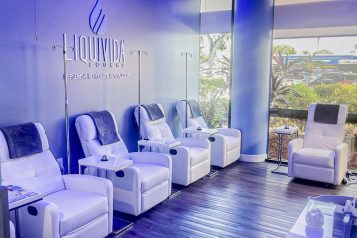Do you get anxiety going to the dentist? If the mere thought of a dental visit induces stress, you’re not alone. Many individuals grapple with dental anxiety, leading to postponed appointments and neglected oral health. However, there’s a transformative solution that promises to turn this anxiety-laden experience into a relaxing visit – sedation dentistry. Leading the charge in patient-centered comfort is Union Square Dental Practice, where every visit is designed to prioritize your peace of mind. Join us on a journey where dental anxiety becomes a thing of the past, and sweet dreams await in the dentist’s chair.
 Photo Credit: Courtesy of Shutterstock
Photo Credit: Courtesy of Shutterstock
What is sedation dentistry, and how does it differ from traditional dentistry methods?
Sedation dentistry allows your dentist to deliver a diverse range of dental treatments with safety and comfort, particularly catering to patients who may experience anxiety during dental visits. The advantages of sedation dentistry are manifold. This specialized approach provides a heightened level of sedation, surpassing that of local anesthesia, and is especially beneficial for individuals who require additional support due to anxiety, challenges in achieving or maintaining numbness, or difficulty remaining still on the dental chair for prolonged periods. By offering an elevated level of sedation, we ensure a customized and relaxed experience, addressing the unique needs and concerns of each patient with utmost care and proficiency.
What are the different types of sedation used in dentistry, and how do they work?
Mild Sedation: Under mild sedation, the patient is at ease and aware of their surroundings, maintaining a state of relaxation within their consciousness. This level of sedation allows the patient to remain responsive to verbal commands and external stimulation. A personalized and gradual approach is often employed to achieve the recommended dosage, recognizing the unique needs and requirements of each patient.
Moderate Sedation: Moderate sedation represents a heightened level of relaxation, with responsiveness to light stimulation. Patients under this form of sedation may experience drowsiness and the possibility of sleeping during the procedure. Our anesthesiologist is dedicated to ensuring a safe and secure environment, carefully managing the required level of unconsciousness for optimal patient comfort and well-being.
Deep Sedation: In deep sedation, the patient enters a profound state of sleep, effectively mitigating anxiety and discomfort. While breathing independently, supplemental oxygen is typically administered to ensure optimal respiratory support. This meticulous and closely monitored care proves exceptionally effective, empowering the dentist to deliver comprehensive dental care with utmost comfort for every individual, irrespective of their prior dental experiences.
General Anesthesia: General anesthesia induces a controlled state of unconsciousness where a patient cannot see or hear anything during the procedure. The medication can be administered through various routes and can be done in both a hospital operating room and the dental office. Serving as an extension of deep sedation, general anesthesia effectively restricts movement and minimizes discomfort during dental treatment. The administration of this anesthesia type necessitates the expertise of a highly trained and specialized dental anesthesiologist, ensuring unwavering dedication to patient safety throughout the entirety of the procedure.
Are there any medical conditions or medications that may impact the use of sedation in dentistry?
Specific medical conditions serve as contraindications to dental sedation. These include, but are not confined to, high BMI, particular kidney and liver issues, select airway and lung diseases, and pregnancy, among others. A comprehensive assessment of your medical history and current physical condition is required during the consultation appointment. In cases where deemed necessary, we will further collaborate by conducting additional consultations with your primary care physician or relevant medical specialists, ensuring a thorough medical workup. These evaluations are completed with the primary objective of optimizing your long-term outcome and minimizing potential complications during the procedure.
How does sedation dentistry benefit patients who experience dental anxiety or phobia?
Sedation dentistry allows your doctor to provide a variety of dental treatments safely and comfortably for patients who experience anxiety when visiting the dentist. There are several benefits to sedation dentistry, including:
• No memory of undergoing the procedure
• No sense of time while under sedation
• No sense of smell or sound
• No fear or anxiety during treatment
Can sedation dentistry be used for routine dental cleanings and check-ups?
Over the last decade, significant advancements in specialized training have substantially elevated the safety standards of anesthesia services within dental offices. Our dental anesthesiologist stands at the forefront of this progress, possessing extensive training in administering all dentistry levels– from light sedation to general anesthesia. While sedation dentistry is commonly sought for more complex dental procedures, some individuals, such as those with severe autism or mental disabilities, opt for sedation even during routine checkups and cleanings.
Are there any age limitations for undergoing sedation dentistry?
Dental sedation is generally extended to patients aged 3 years and above in most cases.
Reach out to Union Square Dental Practice today to schedule a personalized consultation and take the first step toward achieving your dental wellness goals.
For more information, visit Dr. Brian A. Levine's social media:

























